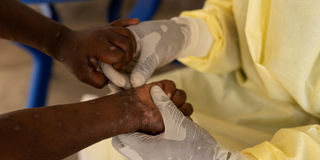WHO calls for support to end Mpox as disease spreads to 17 African countries

A nurse takes a sample from a child declared a suspected case of Mpox - an infectious disease caused by the monkeypox virus that sparks off a painful rash, enlarged lymph nodes and fever.
What you need to know:
- While 12,221 cases are in the suspected category, 2,853 cases have been confirmed.
- According to WHO, three types of vaccines are available and recommended for those who have close contact with infected patients.
This year alone, the number of Mpox cases reported in parts of Africa has cumulatively increased by more than 160 per cent compared to last year.
Data released by the Africa Centre of Diseases Control (CDC) shows that between the beginning of the year and July 28, 2024, a total of 14 250 cases had been reported in 10 countries, including Burundi, Cameroon, Congo, Ghana, Liberia, Nigeria, Rwanda, DRC and South Africa. In the last 12 months, the public health agency noted that 17 countries had reported incidences of Mpox.
While 12,221 cases are in the suspected category, 2,853 cases have been confirmed. Africa CDC, in their latest Mpox situation update, said that the spread had resulted in 461 deaths, a sum figure of all fatalities from just 10 countries, with 450 deaths in DRC, where it is endemic.
Notably, these numbers do not include the case that was reported in Kenya last week and the two cases reported in Kasese district in Uganda on Saturday. The two individuals are in an area near DRC, hundreds of kilometres away from the Taita Taveta border where the virus was detected in a long-distance truck driver who was reportedly travelling from Uganda to Rwanda through Kenya.
Wild animals
The World Health Organisation (WHO) defines Mpox, also known as monkeypox, as a viral infection that can spread between people or through surfaces that have been touched by people infected with Mpox. It is also possible for the virus to be passed from wild animals to people who have contact with them. Mpox is part of the same family that causes smallpox.
It can cause symptoms such as rashes, fever, headache, muscle aches, back pain, low energy and swollen glands. The rash is self-absolving, typically between two to four weeks. WHO notes that "the rash looks like blisters or sores, and can affect the face, palms of the hands, soles of the feet, groin, genital and or anal regions. Patients with severe symptoms may show signs of more widespread lesions, and blood and lung infections. Depending on other underlying factors, it can result in death.
According to WHO, three types of vaccines are available and recommended for those who have close contact with infected patients. However, it does not recommend mass vaccination.
While 96 per cent of all cases, including deaths, have been reported in just one country – DRC, health officials have called for ramped-up surveillance measures to contain the situation.
In a recent post on X, WHO Director-General Tedros Ghebreyesus called for more funding and support to interrupt disease transmission.
"I am considering convening an International Health Regulations Emergency Committee to advise me on whether the outbreak of Mpox should be declared a public health emergency of international concern," he said in the post.
Sh1.3 billion
Meanwhile, Africa CDC has received an emergency approval of Sh1.3 billion (USD 10.4 million) from the African Union, money drawn from the existing Covid-19 funds to combat the outbreak.
"The funding released will complement national efforts by African Governments and support from various partners to strengthen five critical areas in the fight against Mpox: enhancing Mpox surveillance and deployment surge capacity, boosting laboratory testing and genomic sequencing capacity, strengthening regional and national data collection and analytics, enhancing case management, infection prevention and control, and risk communication and community engagement, and improving access and delivery of vaccines, diagnostics, and supplies across the continent.
The Africa CDC said the Mpox death rate this year, at about 3 per cent, has been higher in countries in Africa than in any other part of the world. During the 2022 global Mpox emergency, less than 1 per cent of those infected died.
On Monday, the Ministry of Health in Kenya maintained that since last week, no new cases of Mpox have been identified or reported in the country and it "continues to monitor the patient and trace all close contacts at his workplace, the hospital where he was admitted and along travel routes."
MOH emphasises prevention by avoiding physical contact with someone who has the disease and reporting suspected cases through emergency hotline numbers 719, 0729471414 or 0732353535.





